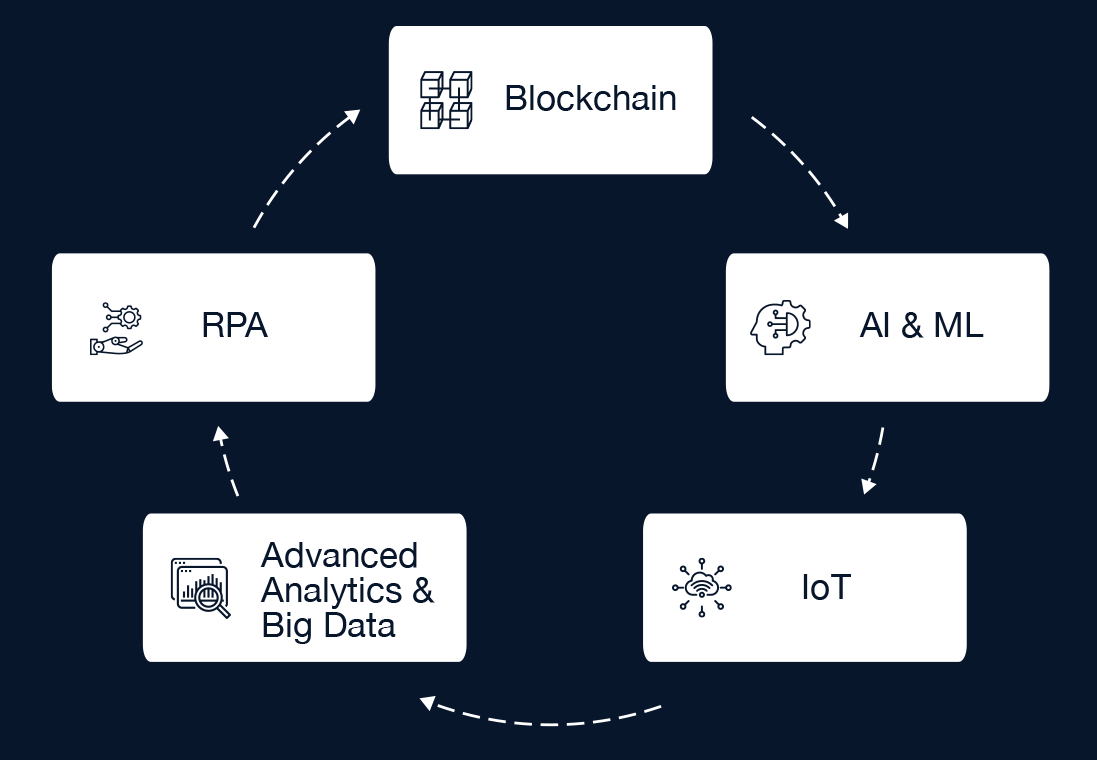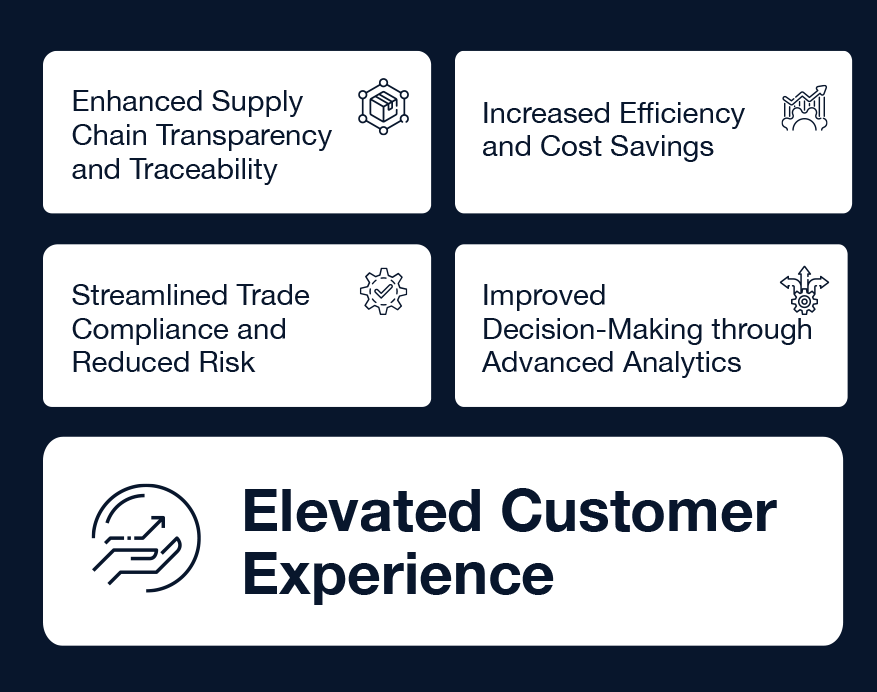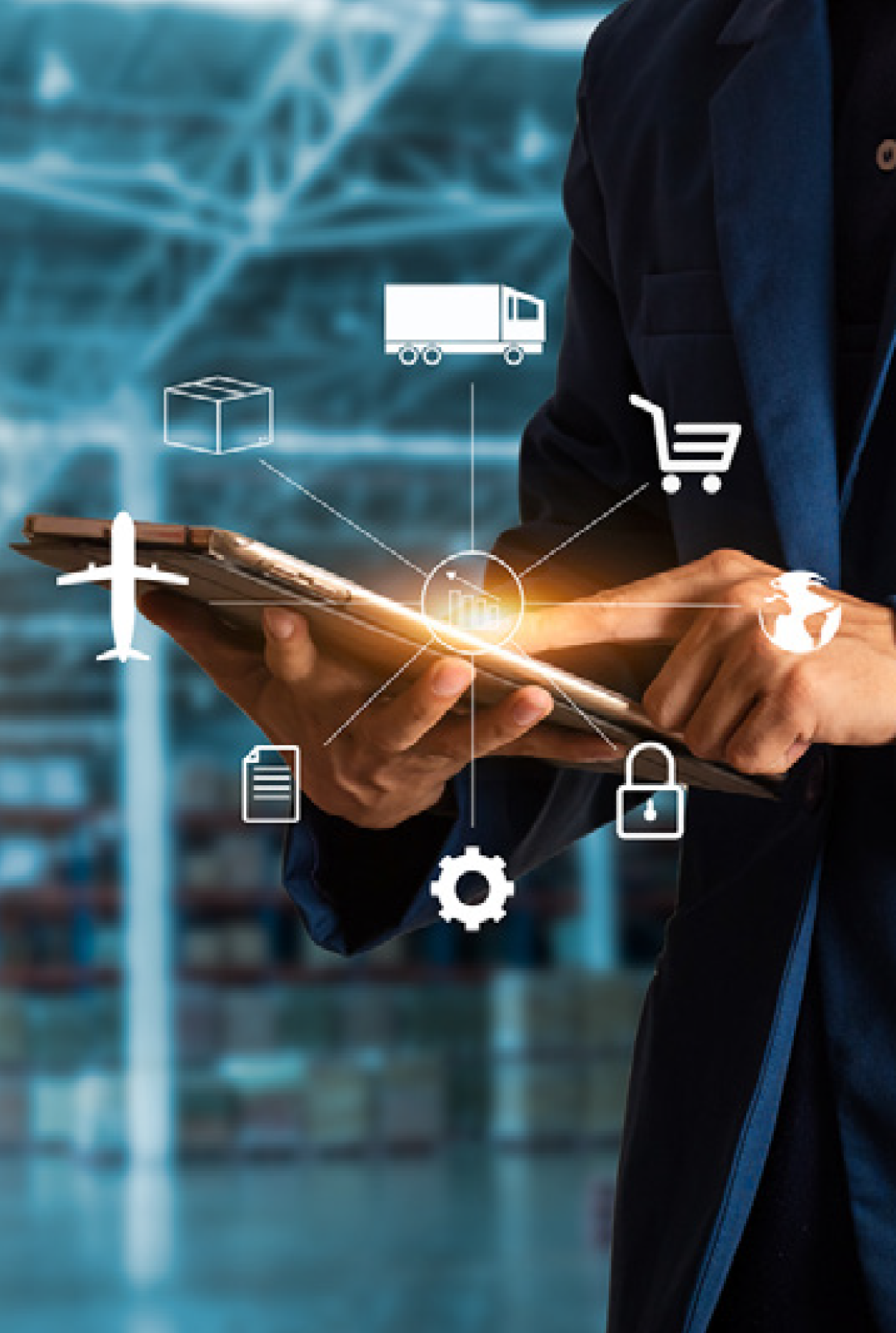“As businesses navigate the complexities of cross-border transactions, they must also adapt to the ever-changing digital environment to remain competitive and meet the demands of modern trade.”
— Economicshelp.org
In today’s globalized economy, international trade has become an essential driver of economic growth and prosperity for countries and businesses alike.1 It opens new markets and exposes countries to goods and services unavailable in their domestic economies.2 As businesses navigate the complexities of cross-border transactions, they must also adapt to the ever-changing digital environment to remain competitive and meet the demands of modern trade.
By leveraging next-generation technologies, companies can streamline their operations, optimize their supply chains, and simplify trade compliance, unlocking new efficiencies and reducing costs.3 Furthermore, digital transformation enables organizations to enhance their customer experience, strengthen their competitive advantage, and capitalize on emerging opportunities in global markets.3
In this whitepaper, we will explore the challenges of traditional international trade practices and examine how next-generation technologies, such as blockchain, artificial intelligence, and the Internet of Things, are revolutionizing the way international trade operates. Additionally, we will discuss how Ropaar can help in accelerating digital transformation within the global trade, transportation, and logistics industries. By the end of this whitepaper, you will gain valuable insights into the benefits of embracing digital transformation in international trade and learn how your business can adapt to the future of global commerce.
“Supply chain inefficiencies can crush customer experience and cost businesses millions of dollars.”
— Forbes
International trade has long been an integral part of the global economy, enabling businesses to expand their markets, access new resources, and diversify their offerings.4
However, traditional trade practices have also brought forth a myriad of challenges that hinder efficiency, increase costs, and expose businesses to potential risks.5 In this section, we will delve into the most pressing
issues faced by international traders in the
pre-digital era.

Traditional supply chain and logistics processes are often burdened by manual, paper-based documentation, and disjointed communication between various parties.6 This lack of integration can result in significant delays, errors, and increased costs throughout the supply chain. Moreover, businesses face challenges in managing inventory, forecasting demand, and optimizing transportation routes, all of which contribute to inefficiencies and hinder their ability to meet customer expectations.6

Navigating the complex web of international trade regulations, tariffs, and customs procedures can be a daunting task for businesses. Ensuring compliance with ever-changing trade policies, while also managing various import and export documentation requirements, places a considerable burden on organizations.7 Non-compliance with these regulations can lead to hefty fines, penalties, and reputational damage, making it crucial for businesses to stay abreast of the latest developments in trade compliance.

In the traditional global trade landscape, businesses often struggle with limited visibility and control over their operations.8 This is particularly true when it comes to tracking the movement of goods across borders and monitoring the performance of various supply chain partners. The absence of real-time, accurate data hampers decision-making and prevents organizations from proactively addressing potential issues before they escalate, ultimately undermining their ability to succeed in the competitive international trade environment.
These challenges underscore the need for a more efficient, transparent, and agile approach to international trade—one that harnesses the power of digital transformation to overcome the inherent limitations of traditional practices. In the following sections, we will explore the next-generation technologies that are revolutionizing global trade and how businesses can leverage them to streamline operations, ensure compliance, and gain a competitive edge.
In response to the challenges posed by traditional international trade practices, next-generation technologies have emerged as powerful tools to revolutionize the industry.9 These innovative solutions are transforming the way businesses operate, enabling them to overcome inefficiencies, mitigate risks, and unlock new opportunities. According to McKinsey, “Alibaba’s AliResearch projects that cross-border B2C e-commerce sales alone will reach approximately $1 trillion by 2020. B2B e-commerce could be five or six times that figure."10
In this section, we will provide an overview of the key technologies that are reshaping the international trade landscape.
These next-generation technologies are not only transforming the way international traders operate but also paving the way for a more efficient, resilient, and sustainable global trade ecosystem. In the following section, we will delve deeper into the specific benefits of these technologies and how they are revolutionizing international trade operations.


Blockchain technology offers a decentralized, transparent, and secure method for recording and sharing data across multiple parties. In the context of international trade, blockchain can help streamline documentation processes, improve supply chain visibility, and enhance trust between trading partners.11 By enabling real-time tracking of goods and facilitating the secure exchange of trade documents, blockchain can significantly reduce delays, errors, and fraud, ultimately promoting more efficient and transparent cross-border transactions.

AI and ML technologies have the potential to revolutionize various aspects of international trade, from supply chain management to trade compliance.12 By leveraging AI-powered algorithms, businesses can improve demand forecasting, optimize inventory levels, and enhance transportation planning. Moreover, AI and ML can help organizations automate the analysis of trade regulations, identify potential compliance risks, and adapt to changes in the regulatory landscape more effectively.

IoT refers to the interconnection of physical devices, such as sensors, vehicles, and machinery, which can communicate and exchange data with one another.13 In international trade, IoT can be leveraged to improve supply chain visibility, monitor the condition of goods in transit, and optimize warehouse operations.14 By providing real-time, granular data on the location and status of shipments, IoT enables businesses to make informed decisions, reduce waste, and enhance customer satisfaction.

The growing availability of big data in international trade, coupled with advancements in analytics capabilities, has opened new opportunities for businesses to gain insights and drive operational efficiency. 15 Advanced analytics tools can help organizations identify patterns and trends in supply chain data, uncover hidden inefficiencies, and predict potential disruptions.16 By leveraging these insights, businesses can make data-driven decisions, streamline their operations, and better serve their customers.

RPA involves the use of software robots to automate repetitive, rule-based tasks, thereby reducing manual labor and increasing efficiency.17 In the realm of international trade, RPA can be employed to automate various processes, such as data entry, document management, and trade compliance checks. By streamlining these time-consuming tasks, RPA allows businesses to focus on higher-value activities, improve accuracy, and reduce operational costs.

The adoption of next-generation technologies in international trade has brought about significant improvements in the way businesses operate, creating numerous benefits for companies and their customers.
In this section, we will explore the ways in which these technologies are revolutionizing international trade operations.

Next-generation technologies like blockchain and IoT provide unparalleled visibility into the supply chain, allowing businesses to track the movement of goods in real time and verify the authenticity of trade documents.18 This heightened level of transparency and traceability not only helps companies optimize their operations but also fosters trust among trading partners and ensures the integrity of the goods being traded.

The complex nature of international trade regulations can pose significant challenges for businesses, with noncompliance leading to costly penalties and reputational damage. By leveraging AI, ML, and RPA, companies can automate the monitoring and analysis of trade regulations, streamlining the compliance process and minimizing the risk of costly errors.19 These technologies also enable businesses to identify and address potential risks proactively, ensuring a more robust and resilient supply chain.

The integration of big data and advanced analytics into international trade operations allows businesses to make more informed decisions based on real-time, data-driven insights.20 By analyzing patterns and trends in supply chain data, organizations can identify inefficiencies, predict disruptions, and optimize their operations. This enhanced decision-making capability enables businesses to respond more effectively to changes in the market and capitalize on emerging opportunities.

According to Deloitte’s annual RPA survey,21 “61% of respondents report that their expectations of cost reduction from robotic process automation (RPA) have been met or exceeded.” Hence, next-generation technologies such as RPA and IoT help businesses automate repetitive tasks, optimize resource utilization, and reduce operational costs. By streamlining various aspects of international trade operations, companies can achieve significant cost savings, increase productivity, and ultimately improve their bottom line.22

The digital transformation of international trade operations has a direct impact on the customer experience. By leveraging next-generation technologies, businesses can deliver goods more quickly, accurately, and costeffectively, resulting in higher customer satisfaction.23 Furthermore, the improved visibility and traceability provided by these technologies enable companies to address customer concerns more effectively and offer greater transparency into the status of their shipments.
In summary, the integration of next-generation technologies into international trade operations has the potential to revolutionize the industry, delivering significant benefits to businesses and their customers. In the next section, we will examine the role of Ropaar, an SAP services company, in driving this digital transformation and helping clients harness the power of these cutting-edge technologies.
As an SAP North American Silver Partner with over 20 years of experience in the global trade, transportation, and logistics sectors, Ropaar has positioned itself as a leader in driving digital transformation for its clients. In this section, we will explore Ropaar’s SAP services and expertise in international trade, their innovative use of next-generation technologies, and the impact of their solutions on client success.
Ropaar specializes in providing end-to-end SAP solutions tailored to the needs of businesses engaged in international trade. Their services encompass SAP GTS implementation and support, global trade compliance consulting, transportation and logistics consulting, supply chain management consulting, custom software development, and training and education. Ropaar’s team of experts has extensive domain knowledge and is dedicated to helping clients navigate the complexities of global trade while ensuring compliance with ever-changing regulations.
Ropaar recognizes the transformative potential of next-generation technologies and actively integrates them into their SAP solutions to create cutting-edge, comprehensive offerings for their clients. By leveraging technologies such as blockchain, AI, ML, IoT, advanced analytics, and RPA, Ropaar helps businesses streamline their operations, optimize their supply chains, and simplify trade compliance. This innovative approach enables Ropaar’s clients to harness the power of digital transformation and stay ahead of the curve in the rapidly evolving international trade landscape.
In the next section, we will discuss strategies for businesses to stay competitive in the evolving landscape and Ropaar’s commitment to supporting clients through the digital journey.

As the global trade landscape continues to evolve, businesses must adopt a proactive approach to digital transformation to remain competitive and capitalize on emerging opportunities. In this section, we will discuss the importance of embracing digital transformation, strategies for businesses to stay competitive in the evolving landscape, and Ropaar’s commitment to supporting clients through the digital journey.
Digital transformation is no longer a luxury but a necessity for businesses engaged in international trade. By proactively adopting next-generation technologies and incorporating them into their operations, companies can enhance their agility, resilience, and efficiency, allowing them to better respond to the challenges and opportunities presented by the ever-changing global market. Furthermore, embracing digital transformation enables businesses to unlock new efficiencies, reduce costs, and deliver an elevated customer experience, strengthening their competitive advantage.

To stay competitive in the rapidly evolving international trade landscape, businesses must adopt a forward-looking approach and invest in the following strategies:

Leverage next-generation technologies: Incorporate technologies such as blockchain, AI, ML, IoT, advanced analytics, and RPA into your operations to streamline processes, optimize supply chains, and ensure compliance with trade regulations.

Invest in digital skills and expertise: Develop the necessary digital competencies within your organization to effectively implement and manage next-generation technologies.

Foster a culture of innovation: Encourage a mindset of continuous improvement and innovation within your organization to drive ongoing transformation and stay ahead of the competition.

Collaborate with trusted partners: Engage with experienced service providers, like Ropaar, that have the domain knowledge and technical expertise to help guide your digital transformation journey and ensure the successful implementation of next-generation solutions.
Ropaar is committed to helping its clients thrive in the digital age by offering tailored SAP solutions and expert guidance on the adoption of next-generation technologies. By leveraging Ropaar’s services and expertise, businesses can navigate the complexities of global trade, ensure compliance with evolving regulations, and capitalize on the benefits of digital transformation. Ropaar’s dedication to effective collaboration and cutting-edge thought leadership ensures that its clients are well-equipped to face the challenges and opportunities presented by the future of international trade.
As the international trade landscape continues to evolve, businesses must embrace digital transformation and adopt next-generation technologies to remain competitive. By partnering with trusted service providers like Ropaar and implementing the right strategies, companies can successfully navigate the digital journey and thrive in the global market.
As we have explored throughout this whitepaper, the future of international trade in the digital age is being reshaped by the transformative potential of next-generation technologies. These innovative solutions are revolutionizing the way businesses operate, enabling them to overcome traditional challenges and unlock new opportunities in the global market.

Next-generation technologies, such as blockchain, AI, ML, IoT, advanced analytics, and RPA, are driving significant improvements in supply chain transparency, trade compliance, operational efficiency, and customer experience.

Embracing digital transformation is crucial for businesses engaged in international trade to stay competitive and capitalize on emerging opportunities.

Adopting a proactive approach to digital transformation, investing in digital skills, fostering a culture of innovation, and collaborating with trusted partners are essential strategies for businesses to thrive in the evolving international trade landscape.

Ropaar, as an SAP services company with deep expertise in global trade, transportation, and logistics, is wellpositioned to support clients in their digital journey by offering tailored SAP solutions and expert guidance on the adoption of next-generation technologies.

In conclusion, the future of international trade in the digital age holds immense promise for businesses that are willing to embrace digital transformation and harness the power of next-generation technologies. By adopting a forward-looking approach and partnering with experienced service providers like Ropaar, companies can successfully navigate the digital journey and secure a competitive advantage in the global market. As we move forward into this exciting new era, the opportunities for growth and innovation in international trade are vast, and those who seize them will undoubtedly shape the future of the industry.